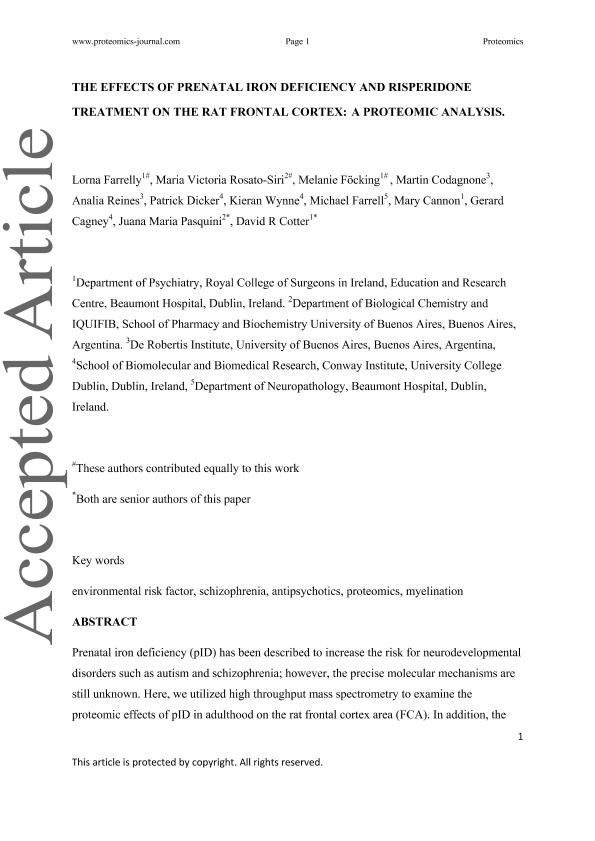Artículo
The Effects of Prenatal Iron Deficiency and Risperidone Treatment on the Rat Frontal Cortex: A Proteomic Analysis
Farrelly, Lorna; Rosato Siri, María Victoria ; Föcking, Melanie; Codagnone, Martín Gabriel
; Föcking, Melanie; Codagnone, Martín Gabriel ; Reines, Analia Gabriela
; Reines, Analia Gabriela ; Dicker, Patrick; Wynne, Kieran; Farrell, Michael; Cannon, Mary; Cagney, Gerard; Pasquini, Juana Maria
; Dicker, Patrick; Wynne, Kieran; Farrell, Michael; Cannon, Mary; Cagney, Gerard; Pasquini, Juana Maria ; Cotter, David R.
; Cotter, David R.
 ; Föcking, Melanie; Codagnone, Martín Gabriel
; Föcking, Melanie; Codagnone, Martín Gabriel ; Reines, Analia Gabriela
; Reines, Analia Gabriela ; Dicker, Patrick; Wynne, Kieran; Farrell, Michael; Cannon, Mary; Cagney, Gerard; Pasquini, Juana Maria
; Dicker, Patrick; Wynne, Kieran; Farrell, Michael; Cannon, Mary; Cagney, Gerard; Pasquini, Juana Maria ; Cotter, David R.
; Cotter, David R.
Fecha de publicación:
09/2017
Editorial:
Wiley VCH Verlag
Revista:
Proteomics (weinheim. Print)
ISSN:
1615-9853
Idioma:
Inglés
Tipo de recurso:
Artículo publicado
Clasificación temática:
Resumen
Prenatal iron deficiency (pID) has been described to increase the risk for neurodevelopmental disorders such as autism and schizophrenia; however, the precise molecular mechanisms are still unknown. Here, we utilized high throughput mass spectrometry to examine the proteomic effects of pID in adulthood on the rat frontal cortex area (FCA). In addition, the FCA proteome was examined in adulthood following risperidone treatment in adolescence to see if these effects could be prevented. We identified 1501 proteins of which 100 were significantly differentially expressed in the FCA at post-natal day 90. Pathway Analysis of proteins affected by pID revealed changes in metabolic processes, including the tricyclic acid cycle, mitochondrial dysfunction, and P13K/Akt signaling. Interestingly, most of these protein changes were not present in the adult pID offspring who received risperidone in adolescence. Considering the link between prenatal iron deficiency and several neurodevelopmental disorders such as autism and schizophrenia these presented results bring new perspectives to understand the role of iron in metabolic pathways and provide novel biomarkers for future studies of prenatal iron deficiency.
Palabras clave:
Schizophrenia
,
Myelination
,
Antipsychotics
,
Proteomics
Archivos asociados
Licencia
Identificadores
Colecciones
Articulos(IBCN)
Articulos de INST.DE BIOLO.CEL.Y NEURCS."PROF.E.DE ROBERTIS"
Articulos de INST.DE BIOLO.CEL.Y NEURCS."PROF.E.DE ROBERTIS"
Citación
Farrelly, Lorna; Rosato Siri, María Victoria; Föcking, Melanie; Codagnone, Martín Gabriel; Reines, Analia Gabriela; et al.; The Effects of Prenatal Iron Deficiency and Risperidone Treatment on the Rat Frontal Cortex: A Proteomic Analysis; Wiley VCH Verlag; Proteomics (weinheim. Print); 17; 17-18; 9-2017; 1-24
Compartir
Altmétricas



